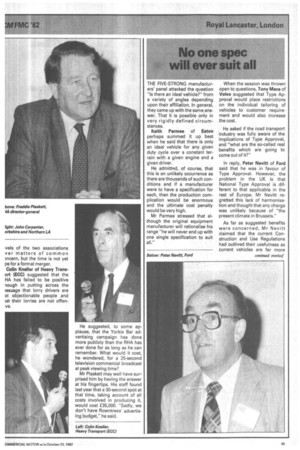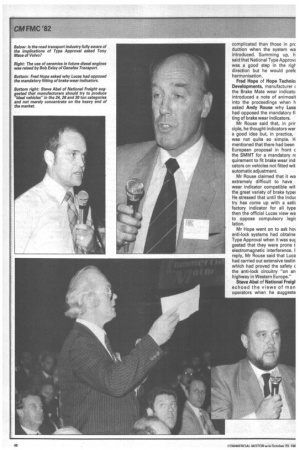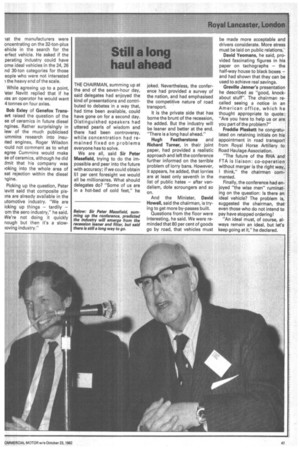THE FIVE-STRONG manufacturers' panel attacked the question "Is there an
Page 31

Page 32

Page 33

If you've noticed an error in this article please click here to report it so we can fix it.
ideal vehicle?" from a variety of angles depending upon their affiliation. In general, they came up with the same answer. That it is possible only in very rigidly defined circumstances.
Keith Parrnee of Eaton perhaps summed it up best when he said that there is only an ideal vehicle for any given duty cycle over a constant terrain with a given engine and a given driver.
He admitted, of course, that this is an unlikely occurrence as there are thousands of such conditions and if a manufacturer were to have a specification for each, then the production complication would be enormous and the ultimate cost penalty would be very high.
Mr Parmee stressed that although the original equipment manufacturer will rationalise his range "he will never end up with one single specification to suit all."
When the session was thrown open to questions, Tony Mace of Volvo suggested that Type Approval would place restrictions on the individual tailoring of vehicles to customer requirement and would also increase the cost.
He asked if the road transport industry was fully aware of the implications of Type Approval, and "what are the so-called real benefits which are going to come out of it?"
In reply, Peter Nevitt of Ford said that he was in favour of Type Approval. However, the problem in the UK is that National Type Approval is different to that applicable in the rest of Europe. Mr Nevitt regretted this lack of harmonisation and thought that any charge was unlikely because of "the present climate in Brussels."
As far as suggested benefits were concerned, Mr Nevitt claimed that the current Construction and Use Regulations had outlived their usefulness as current vehicles are far more complicated than those in prc duction when the system wa introduced. Summing up, h said that National Type Approve was a good step in the righ direction but he would prefe harmonisation.
Fred Hope of Hope Technici Developments, manufacturer the Brake Mate wear indicato introduced a note of animosit into the proceedings when h asked Andy Rouse why Luca had opposed the mandatory fl ting of brake wear indicators.
Mr Rouse said that, in prir ciple, he thought indicators wer a good idea but, in practice, was not quite so simple. H mentioned that there had been European proposal in front c the SMMT for a mandatory rE quirement to fit brake wear ind cators on vehicles not fitted wit automatic adjustment.
Mr Rouse claimed that it wa extremely difficult to have wear indicator compatible wit the great variety of brake types He stressed that until the indus try has come up with a satis factory indicator for all type then the official Lucas view wa to oppose compulsory legis lation.
Mr Hope went on to ask hor anti-lock systems had obtains, Type Approval when it was suc gested that they were prone t, electromagnetic interference. I reply, Mr Rouse said that Luca had carried out extensive testin which had proved the safety c the anti-lock circuitry "on an highway in Western Europe."
Steve Abel of National Freigt echoed the views of man operators when he suggeste lat the manufacturers were oncentrating on the 32-ton-plus ehicle in the search for the erfect vehicle. He asked if the perating industry could have ome ideal vehicles in the 24, 26 nd 30-ton categories for those eople who were not interested the heavy end of the scale.
While agreeing up to a point, 'eter Nevitt replied that if he as an operator he would want 4 tonnes on four axles.
Bob Exley of Genefox Transort raised the question of the se of ceramics in future diesel ngines. Rather surprisingly in iew of the much publicised ummins research into insulted engines, Roger Wilsdon Fou I d not comment as to what egree Cummins would make se of ceramics, although he did dmit that his company was poking into the whole area of eat rejection within the diesel igine.
Picking up the question, Peter levitt said that composite pisms are already available in the utomotive industry. "We are icking up things — tardily — om the aero industry," he said. VVe're not doing it quickly nough but then it's a slowloving industry."


















































































































